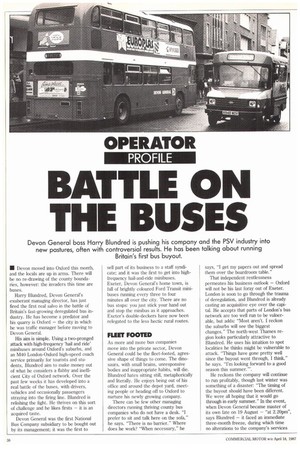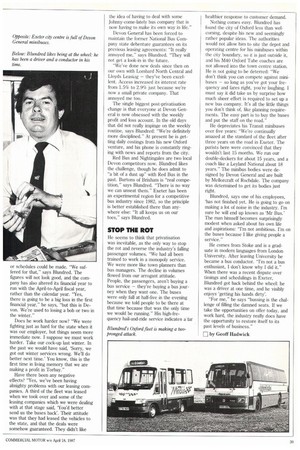BATTLE ON THE BUSES
Page 40

Page 41

If you've noticed an error in this article please click here to report it so we can fix it.
Devon General boss Harry Blundred is pushing his company and the PSV industry into new pastures, often with controversial results. He has been talking about running Britain's first bus buyout.
• Devon moved into Oxford this month, and the locals are up in arms. There will be no re-drawing of the county boundaries, however: the invaders this time are buses.
Harry Blundred, Devon General's exuberant managing director, has just fired the first real salvo in the battle of Britain's fast-growing deregulated bus industry. He has become a predator and his quarry is Oxford — the city in which he was traffic manager before moving to Devon General.
His aim is simple. Using a two-pronged attack with high-frequency 'hail and ride' minibuses around Oxford's suburbs, and an M40 London-Oxford high-speed coach service primarily for tourists and students, Blundred aim to make money out of what he considers a flabby and inefficient City of Oxford network. Over the past few weeks it has developed into a real battle of the buses, with drivers, vehicles and occasionally passengers straying into the firing line. Blundred is relishing the fight. He thrives on this sort of challenge and he likes firsts — it is an acquired taste.
Devon General was the first National Bus Company subsidiary to be bought out by its management; it was the first to sell part of its business to a staff syndicate; and it was the first to get into highfrequency hail-and-ride minibuses. Exeter, Devon General's home town, is full of brightly coloured Ford Transit minibuses running every three to four minutes all over the city. There are no bus stops: you just stick your hand out and stop the minibus as it approaches. Exeter's double-deckers have now been relegated to the less hectic rural routes.
FLEET FOOTED
As more and more bus companies move into the private sector, Devon General could be the fleet-footed, agressive shape of things to come. The dinosaurs, with small brains, unresponsive bodies and inappropriate habits, will die. Blundred hates sitting still, metaphorically and literally. He enjoys being out of his office and around the depot yard, meeting people or heading off to Oxford to nurture his newly growing company.
There can be few other managing directors running thriving county bus companies who do not have a desk. "I prefer to sit and talk here on the sofa," he says. "There is no barrier." Where does he work? "When necessary," he says, "I get my papers out and spread them over the boardroom table."
That independent restlessness permeates his business outlook — Oxford will not be his last foray out of Exeter. London is soon to go through the trauma of deregulation, and Blundred is already casting an acquisitive eye over the capital. He accepts that parts of London's bus network are too well run to be vulnerable, but adds: "Most aren't. I reckon the suburbs will see the biggest changes." The north-west Thames region looks particularly attractive to Blundred. He uses his intuition to spot localities he thinks might be vulnerable to attack. "Things have gone pretty well since the buyout went through, I think," he says. "I'm looking forward to a good season this summer."'.
He reckons the company will continue to run profitably, though last winter was something of a disaster "The timing of the buyout should have been different. We were all hoping that it would go through in early summer." In the event, when Devon General became master of its own fate on 19 August — "at 2.20pm", says Blundred — it faced an immediate three-month freeze, during which time no alterations to the company's services or schedules could be made. "We suffered for that," says Blundred. The figures will not look good, and the company has also altered its financial year to run with the April-to-April fiscal year, rather than the calendar year. "Yes, there is going to be a big loss in the first financial year," he says, "but this is Devon. We're used to losing a bob or two in the winter."
Does he work harder now? "We were fighting just as hard for the state when it was our employer, but things seem more immediate now. I suppose we must work harder. Take our cock-up last winter. In the past we would have said, 'Sorry, we got out winter services wrong. We'll do better next time.' You know, this is the first time in living memory that we are making a profit in Torbay."
Have there been any negative effects? "Yes, we've been having almighty problems with our leasing companies. A third of the fleet was leased when we took over and some of the leasing companies which we were dealing with at that stage said, 'You'd better send us the buses back'. Their attitude was that they had leased the vehicles to the state, and that the deals were somehow guaranteed. They didn't like the idea of having to deal with some Johnny-come-lately bus company that is now having to make its own way in life."
Devon General has been forced to maintain the former National Bus Company state debenture guarantees on its previous leasing agreements: "It really annoyed me," says Blundred. "They will not get a look-in in the future.
"We've done new deals since then on our own with Lombard North Central and Lloyds Leasiog — they've been excellent. Access increased its interest rate from 1.5% to 2.9% just because we're now a small private company. That annoyed me too.
The single biggest post-privatisation change is that everyone at Devon General is now obsessed with the weekly profit and loss account. In the old days that did not really impinge on the weekly routine, says Blundred: "We're definitely more disciplined." At present he is getting daily costings from his new Oxford venture, and his phone is constantly ringing with news and reports from the city.
Red Bus and Nightingales are two local Devon competitors now. Blundred likes the challenge, though he does admit to "a bit of a dust up" with Red Bus in the past. Burtons of Brixham is "real competition," says Blundred. "There is no way we can unseat them." Exeter has been an experimental region for a competitive bus industry since 1982, so the principle is better established there than anywhere else: "It all keeps us on our toes," says Blundred.
STOP THE ROT
He seems to think that privatisation was inevitable, as the only way to stop the rot and reverse the industry's falling passenger volumes. "We had all been trained to work in a monopoly service. We were more like town planners than bus managers. The decline in volumes flowed from our arrogant attitude. People, the passengers, aren't buying a bus service — they're buying a bus journey when they want one. The buses were only full at half-five in the evening because we told people to be there at that time because that was the only time we would be running." His high-frequency hail-and-ride service indicates a tar healthier response to customer demand.
Nothing comes easy. Blundred has found the city of Oxford less than welcoming, despite his new and seemingly rather popular ideas. The authorities would not allow him to site the depot and operating centre for his minibuses within the city boundary, so it is just outside it, and his M40 Oxford Tube coaches are not allowed into the town centre station. He is not going to be deterred: "We don't think you can compete against minibuses — so long as you've got your frequency and fares right, you're laughing. I must say it did take us by surprise how much sheer effort is required to set up a new bus company. It's all the little things you don't think of, like planning requirements. The easy part is to buy the buses and put the staff on the road."
He depreciates his Transit minibuses over five years: "We're continually amazed at the standard of the fleet after three years on the road in Exeter. The purists here were convinced that they wouldn't last 15 months. We run our double-deckers for about 15 years, and a coach like a Leyland National about 18 years." The minibus bodies were designed by Devon General and are built by Mellorcraft of Rochdale. The company was determined to get its bodies just right.
Blundred, says one of his employees, 'has not finished yet. He is going to go on making a lot of noise in the industry. I'm sure he will end up known as 'Mr Bus.' The man himself becomes surprisingly modest when asked about his own life and aspirations: "I'm not ambitious. I'm on the buses because I like giving people a service."
He comes from Stoke and is a graduate in modern languages from London University. After leaving University he became a bus conductor. "I'm not a bus enthusiast, I don't know why I did it." When there was a recent dispute over timings and schedulings in Exeter, Blundred got back behind the wheel: he was a driver at one time, and he visibly enjoys 'getting his hands dirty'.
"For me," he says "bussing is the challenge of filling the damned seats. If we take the opportunities on offer today, and work hard, the industry really does have the opportunity to restore itself to its past levels of business."
by Geoff Hadwick




















































































